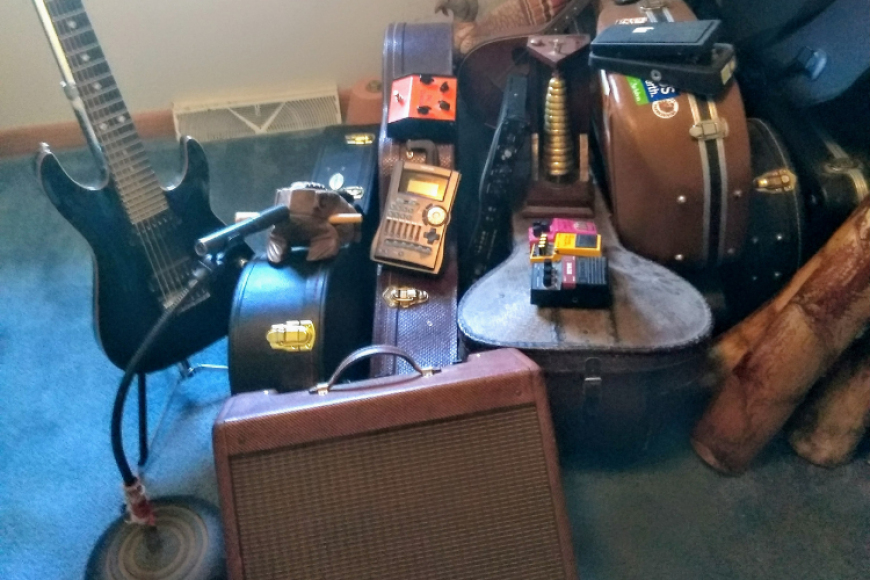Guitarists and Gear: How Much Is Enough?

I'm a guitarist, you're a guitarist. It wouldn't be a stretch to assume that you own more than one guitar. Maybe more than three, or five, or nine as well as a big collection of pedals and at least two amplifiers, but I digress and I believe you get the point.
I've heard this referred to as GAS or Gear Acquisition Syndrome. It's a combination of wanting to expand your repertoire, peer pressure, excellent marketing techniques used by manufacturers and retailers, and your own genuine desire to chase the best possible sound (albeit of the moment in some cases).
Before I discuss my concept of how to assess one's desire to purchase more gear, I’d like to relay a story from my own personal history.
Years ago, I believe I was about 14, I had saved up a small amount of money from cutting lawns. I don’t remember how much, but less than $30.00. I went to the local music store and bought a phase shifter. It too was under $30.00 (this was eons ago) but it was no ordinary piece of gear. According to all the advertisements I had seen in Guitar Player Magazine, it was the best. It could create fluid, rolling sounds and textures reminiscent of Hendrix. If that wasn’t enough, it was (allegedly) used by The Rolling Stones. It had a really cool name: "The Electro Harmonics Small Stone Phase Shifter" and equally cool graphics. So I bought it. It was later that evening when my father asked me what I was going to do with my lawn cutting money, that I proudly told him that I had invested in the aforementioned piece of gear. He looked at it and said, “What does it do?” I explained to him that it was an effect pedal that created all these ultra-cool swirling sound textures by filtering the signal at different rates. He restated the question, “Yeah, but what does it do?” I plugged it in and played some chords with the effect on and he stated “All that stuff you play sounds the same, I think you just wasted your money.” He added that he “never heard anything on the radio that sounded like that” pretty much proclaiming me a sucker.
By contemporary standards of parenting that may seem harsh, but there is a nugget of practicality that can’t be ignored. If you can’t explain something simply, then either the idea isn’t valid, or you don't have the ability to fully comprehend it. At that stage my playing probably all sounded the same and I most likely didn’t do the effect justice. That being the case, maybe I really didn’t need that piece of gear. This brings me to the point of the article: self-assessment.
Disclaimer
I currently own eight guitars: three acoustics, one archtop, and four electrics. In my defense, the archtop and one of the electrics are seven-string guitars, so that sets them apart. I have three amplifiers, two of which are fully functioning (one needs re-tubing). At this point I will never need to buy another piece of guitar gear. Ever.
So, now for self-assessment.
Ask yourself about your current musical status and what your future musical goals are. If you are playing out on a regular basis and use a guitar amplifier, having two is a good idea. This is the concept of redundancy: if one of the amps breaks down, you have an alternate to use in its place. It pays to do some research; buying an amp that is really sturdy, low maintenance and versatile may not be as cool as getting a hyped boutique amp, but if the amp can sit out in the cold, fall off the back of the van and still work, it's a good choice.
When it comes to guitars you really only need two: an acoustic and an electric. I could stop there but that may not be realistic. Ask yourself: If I buy a new guitar, which of my current guitars am I going to sell to make room for it? If you can’t part with any of them, you have answered your own question. Don’t fall victim to peer pressure. If you have a Stratocaster and like it, don’t let your friend who only plays Gibson or Ibanez shame you into a purchase. Believe me, it happens. The idea of buying an instrument because it will increase in value may have some validity, but try selling one. Enough said.
Now effect pedals.
They’re fun, they’re relatively inexpensive (compared to guitars), and if you get bored with them, they make great paper weights. Seriously, there are so many pedals out there it can be overwhelming. Let’s again start by asking the question that I began this tale with:What does it do? I would ask: What is your playing situation? In essence ask if the pedal would improve your playing or improve your life. Most importantly, and this won’t win me any popularity contests, ask yourself: “Will this (guitar, amp, pedal) improve my playing as much as spending more time practicing would?” Once I honestly asked myself this, my gear cravings began to subside.
So looking back at all my rambling I would offer this self-assessment tool in the form of these questions:
1. Will this guitar make me play better? If your current guitar is defective then answer yes. If not, see above question about practicing.
2. Do I have enough variety of instruments to play the current schedule that I have?
3. Do I have a working amplifier? Do I have a working backup amplifier?
4. Am I wanting to buy this pedal because the advertisement makes it sound great and it has cool graphics, or did I have a genuine need for it in the first place?
5. Am I buying this piece of gear on impulse?
6. Am I willing and able to part with any of my existing gear in order to make room for the new thing I’m craving?
7. Can I afford it?
8. Most importantly: Will any of this gear improve my playing as much as spending more time practicing will?
So there it is, my personal guidelines for dealing with Gear Acquisition Syndrome. I hope you find it helpful. Now let’s all get back to browsing Ebay and Reverb practicing!
 |
ABOUT DAVID ANTONIO
David Antionio has been playing the guitar for over 40 years and has experience teaching school age students as well as adults. He also plays and teaches Native American Style Flute and Didgeridoo. |




